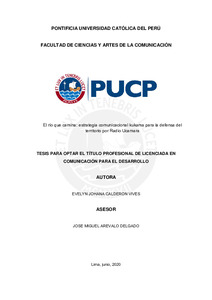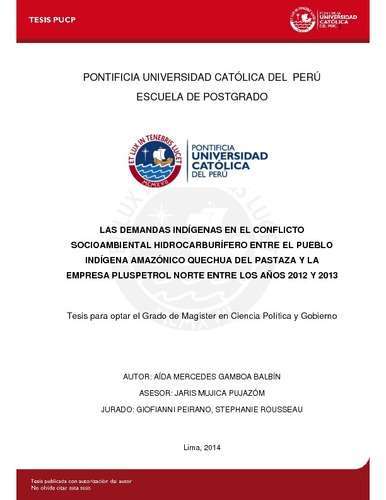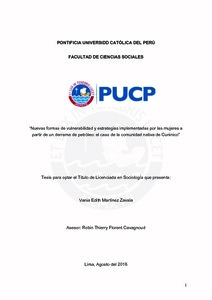| dc.contributor.advisor | Ramos Morales, Leonidas Lucas | |
| dc.contributor.author | Jáuregui Antúnez, Javier Anselmo | |
| dc.contributor.author | Miranda Cabrera, Gino André | |
| dc.date.accessioned | 2024-10-07T17:09:54Z | |
| dc.date.available | 2024-10-07T17:09:54Z | |
| dc.date.created | 2024 | |
| dc.date.issued | 2024-10-07 | |
| dc.identifier.uri | http://hdl.handle.net/20.500.12404/29081 | |
| dc.description.abstract | La presente investigación identifica los factores que han incidido en la calidad de la
prestación de servicios de salud y la alta morbimortalidad de médicos durante la primera
ola de la pandemia por el Covid-19 en la Región Loreto. El presente estudio es de
enfoque cualitativo-cuantitativo, transversal y tipo descriptivo. Se aplicó una entrevista,
especialmente diseñada para la investigación, la cual fue aplicada a un total de 18
profesionales de la salud, entre el Hospital Regional de Loreto, Hospital de Apoyo Iquitos,
Hospital EsSalud Iquitos, Centro de Salud I-3 Pebas y Hospital II-2 Tarapoto, con la
finalidad de realizar una comparación del nivel de calidad. Los resultados demuestran
que la Región Loreto tiene una Baja Calidad de los Servicios de Salud a comparación de
la Región San Martín que contempla un nivel de calidad Regular, los principales factores
que incidieron en la baja calidad de Loreto fueron: Infraestructura y Equipamiento, debido
a que los Establecimientos de salud no contaban con la capacidad instalada óptima
(hacinamiento), asimismo, el material de la infraestructura era inadecuada; asimismo, el
factor de Recursos Humanos, debido a la brecha de médicos especialistas y la falta de
pagos a los trabajadores, conllevó al colapso de los establecimientos por la limitada
ofertada de profesionales de la salud; el factor Logístico, existió desabastecimiento de
Equipos de Protección Personal (EPP), medicamentos, insumos y pruebas rápidas; el
factor Geográfico, las barreras geográficas fueron las principales limitantes para la
atención oportuna de los pobladores y profesionales debido a que no existe transporte y,
el factor Social, en el cual influyó el comportamiento de la población frente a la pandemia,
la especulación del sector privado y la falta de liderazgo de los actores sociales.
Finalmente, se concluye que la Baja Calidad de la prestación del servicio de salud
durante la pandemia en la región Loreto, conllevó en una situación crítica a la población
de Loreto, pero sobre todo al personal de salud que presentó el mayor nivel de
morbimortalidad en todo el Perú. | es_ES |
| dc.description.abstract | The present investigation identifies the factors that have affected the quality of the
provision of health services and the high morbidity and mortality of doctors during the first
wave of the Covid-19 pandemic in the Loreto Region. This study is of a qualitativequantitative,
cross-sectional and descriptive approach. An interview was applied,
specially designed for the investigation, which was applied to a total of 18 health
professionals, between the Regional Hospital of Loreto, Iquitos Support Hospital, Iquitos
EsSalud Hospital, Health Center I-3 Pebas and Hospital II-2 Tarapoto, in order to make a
comparison of the level of quality. The results show that the Loreto Region has a Low
Quality of Health Services compared to the San Martín Region, which has a Regular
quality level. The main factors that influenced the low quality of Loreto were: Infrastructure
and Equipment, due to that the health establishments did not have the optimal installed
capacity (overcrowding), likewise, the infrastructure material was inadequate, the Human
Resources factor, the gap of medical specialists and the lack of payments to the workers,
led to the collapse of establishments for the limited supply of health professionals; the
Logistics factor, there was a shortage of Personal Protection Equipment (PPE),
medicines, supplies and rapid tests, the Geographic factor, Geographical barriers were
the main limitations for the timely care of residents and professionals because there is no
transportation, and the Social factor, which was influenced by the behavior of the
population in the face of the pandemic, private sector speculation and the lack of
leadership of social actors. Finally, it is concluded that the Low Quality of health service
provision during the pandemic in the Loreto region, led to a critical situation for the
population of Loreto, but especially for health personnel who presented the highest level
of morbidity and mortality throughout Peru. | es_ES |
| dc.language.iso | spa | es_ES |
| dc.publisher | Pontificia Universidad Católica del Perú. | es_ES |
| dc.rights | info:eu-repo/semantics/openAccess | es_ES |
| dc.rights.uri | http://creativecommons.org/licenses/by-nc-sa/2.5/pe/ | * |
| dc.subject | Servicios nacionales de salud--Control de calidad--Perú--Loreto | es_ES |
| dc.subject | Médicos--Perú--Loreto | es_ES |
| dc.subject | Mortalidad--Perú--Loreto | es_ES |
| dc.subject | Pandemia de COVID-19, 2020- --Perú--Loreto | es_ES |
| dc.title | Calidad de las prestaciones de Servicios de Salud y la alta morbimortalidad de médicos durante la primera ola de la pandemia por Covid-19 en la región Loreto | es_ES |
| dc.type | info:eu-repo/semantics/masterThesis | es_ES |
| thesis.degree.name | Maestro en Gobierno y Políticas Públicas | es_ES |
| thesis.degree.level | Maestría | es_ES |
| thesis.degree.grantor | Pontificia Universidad Católica del Perú. Escuela de Posgrado. | es_ES |
| thesis.degree.discipline | Gobierno y Políticas Públicas | es_ES |
| renati.advisor.dni | 44385069 | |
| renati.advisor.orcid | https://orcid.org/0000-0001-9285-2953 | es_ES |
| renati.author.dni | 08194360 | |
| renati.author.dni | 43042058 | |
| renati.discipline | 312048 | es_ES |
| renati.juror | Rodríguez Pérez, Berlán | es_ES |
| renati.juror | Ramos Morales, Leonidas Lucas | es_ES |
| renati.juror | Arrunategui Gadea, Jorge Ernesto | es_ES |
| renati.level | https://purl.org/pe-repo/renati/level#maestro | es_ES |
| renati.type | https://purl.org/pe-repo/renati/type#tesis | es_ES |
| dc.publisher.country | PE | es_ES |
| dc.subject.ocde | https://purl.org/pe-repo/ocde/ford#5.06.00 | es_ES |










